Artista plástico de profesión y con una larga trayectoria como caricaturista, ha obtenido numerosos premios internacionales en salones de humor gráfico celebrados en Canadá, Francia, Italia, Suecia, y Portugal, entre otros países. Ha publicado varios libros, entre ellos: Antonio -20 años de Desenhos, Desenhos satíricos, y Traços contínuos. También se dedica a la escultura y medallística.
Colabora o colaboró con los periódicos o revistas: Diario de Noticias, A Capital, A Vida Mundial, O Jornal y Expreso.
Fue en la edición de Expresso del 4 de noviembre de 1975 que nació una especie de tira cómica titulada Kafarnaum, la cual desataría una gran polémica. Obras que luego serían reunidas en lo que sería su primer libro.
En 1983 publicó un nuevo álbum, Suspendórios. Ese mismo año ganó uno de los muchos premios que marcarían su vida: el Gran Premio del XX Salón Internacional de la Historieta de Montreal.
En 1993 se vio envuelto en lo que sería la otra gran polémica de su carrera: el Condón Papal. También este año, Expresso celebró su 20º aniversario publicando sus 20 mejores obras en una antología con una edición limitada de 500 ejemplares numerados y firmados por el artista.
El 9 de marzo de 2005 se le concedió el grado de Gran Oficial de la Orden del Príncipe Enrique.
El 11 de abril de 2023 se le concedió el grado de Comendador de la Orden de la Libertad.
Es director del World Press Cartoon, el Salón más importante de la caricatura de prensa.
En fin, un tremendísimo honor tener en este Vis a vis al reconocido humorista gráfico y promotor del humor, Antonio Antunes.
PP: Antonio, no sé si te presenté bien con tantos datos. Quizás sería mejor, para los seguidores de Humor Sapiens, que nos dijeras, por lo menos, ¿cómo te gustaría que te conocieran, que te recordaran?
ANTONIO: Espero ser recordado como caricaturista y promotor del humor gráfico.
PP: Simplemente así. Perfecto. ¿En qué momento decidiste dedicarte al humor?
ANTONIO: En la víspera de la Revolución Portuguesa, muchas personas, particularmente jóvenes, estaban deseosas de participar en ese cambio. Encontré esa posibilidad en los periódicos, y el humor fue el vehículo para ese deseo.
PP: No recuerdo en esta sección alguien que confesara que su motivación para llegar al humor fuera su idealismo. Te felicito. ¿Y empezaste a dibujar sin estilo? O si tuviste uno, ¿cuál fue? ¿Tuviste alguna influencia de caricaturistas nacionales o extranjeros en ese momento?
ANTONIO: Empecé dibujando caricaturas en un estilo muy simple, inspirado en los cómics, pero el estilo pronto cambió y mis mayores influencias fueron el portugués Rafael Bordalo Pinheiro y el estadounidense David Levine.
PP: ¿Sabes? Conozco algunas obras de Levine, pero te cuento que estuve en La Casa Museo de Bordalo Pinheiro em Lisboa y pasé todo un día disfrutando sus obras. Inolvidable. Grandes influencias tuviste, sin dudas. Bueno, y actualmente, ¿qué modo prefieres: dibujar con humor sin palabras o dibujar con textos? ¿Por qué?
ANTONIO: Inicialmente, usaba globos de texto, pero a medida que fui evolucionando, el dibujo se liberó del texto, y la caricatura se volvió más condensada y simbólica.
PP: Entiendo, más la ventaja de la universalización del mensaje es mucho más fuerte.
ANTONIO: Sí, el reto de comunicar solo a través del dibujo es más exigente y requiere una gran disciplina narrativa.
PP: Viendo tu sustancioso curriculum, quiero preguntarte: ¿cuál de los premios te conmovió más o te impactó más, de los tantos que has recibido?
ANTONIO: El premio que más me conmovió fue el Gran Premio en la 20ª Exposición Internacional de Montreal, Canadá - 1983 (en ese momento la mayor exposición del mundo, por su importancia y porque tuvo lugar en los primeros años de mi carrera, dándome la confianza para continuar).
PP: Me imagino lo emocionante por la importancia del premio y por ser tu primero. Cualquiera estaría un mes celebrando. Y ahora dime, ¿cuál es el humor que más te gusta hacer? Te doy variantes:
a-El que simplemente te divierte.
b-El que te divierte y te hace pensar.
c-El que te hace pensar, pero sólo es crítico, satírico.
d-El burlesco, irrespetuoso, ofensivo.
¿Y por qué no escogiste los otros? (si es que dejaste alguno sin escoger, claro)
ANTONIO: Prefiero b) y c). Los géneros descritos en a) y d) son, en mi opinión, géneros menores.
PP: Ahí difiero contigo. Para mí la diversión pura es muy importante en el ser humano. No lo considero menor, al contrario. Sin ir más lejos, hoy mismo estaba repasando los libros de Quino (no de Mafalda) y ese humor blanco me divierte mucho. Donde sí coincido es en que el supuesto humor ofensivo, agresivo, humillante, es menor. Bueno, no solo menor, es rechazable en mi humilde opinión. Y aquí se viene una pregunta que cae sola: ¿Cuáles son los límites del humor, si los hubiera?
ANTONIO: Los límites del humor deben ser aquellos que puedan ser defendidos éticamente.
PP: “Deben ser”, dices, pero casi nunca los son. Existen los límites externos que nos imponen los gobiernos autoritarios, los intereses comerciales de los medios, o “lo políticamente correcto” de ciertas grupos, etc. Ninguno se pueden defender éticamente como dices, pero están ahí, lamentablemente. A propósito, ¿fuiste censurado alguna vez? ¿Te autocensuras mucho, poco o nunca?
ANTONIO: No, nunca he sido censurado, pero he tenido algunos problemas posteriormente. Prefiero llamarlo adecuación más que autocensura. Adecuación de la forma, pero no del contenido, al estatuto editorial de la publicación, a la cultura del país, etc.
PP: Si lo calificas así solo por la forma, perfecto. ¿Cómo ves el presente y el futuro del humor gráfico?
ANTTONIO: El presente del humor gráfico atraviesa una crisis más general de la prensa escrita. Quiero creer que la situación mejorará en el futuro, a pesar de las redes sociales y ahora también de la inteligencia artificial (IA), pero, por supuesto, tengo muchas dudas.
PP: Coincido, creo que en el presente estamos en crisis por la falta de espacios, la polarización en el mundo, etc. Pero soy optimista con el futuro también. Como siempre digo, solo necesitamos resolver el problema de los derechos de autor en Internet y se resolverían muchas cosas. Pero para apartarnos un poco de algún que otro pensamiento sombrío, ¿podrías contarnos alguna anécdota cómica, curiosa o ingeniosa, que hayas vivido durante tu trayectoria en el humor?
ANTONIO: Di mis primeros pasos como caricaturista dejando una carpeta con dibujos en el periódico “República” y, algún tiempo después, cuando quisieron publicarlos, no sabían cómo debía firmarlos y mi primera caricatura salió sin nombre de autor – con la inscripción habitual “dibujo de...” y un espacio en blanco. En la segunda caricatura, un periodista que era de mi país decidió usar mi primer nombre, António, para que no hubiera más espacios en blanco, y así se quedó.
PP. Linda anécdota e histórica. Esa firma tuya, “Antonio”, te ha llevado lejos en esta carrera, ¿no es cierto?
ANTONIO: He tenido una carrera salpicada de premios en importantes exposiciones internacionales en Canadá, Francia, Italia y Suecia, y con muchas exposiciones individuales en Francia, Países Bajos, Macao, Brasil y España. También he sido jurado en varias exposiciones en Italia, Brasil, Serbia y Grecia. También soy director de World Press Cartoon y presidente del jurado.
PP: Bueno, lo dices rapidito, pero sabemos que el World Press Cartoon es el Concurso más importante del mundo en caricatura de prensa. Aprovecho para felicitarte. Y para ir cerrando, ¿qué me dirías como humorista?
ANTONIO: Diría que el humor es una cosa muy seria.
PP: Ojalá todo el mundo pensara así. Y lo último, Antonio, ¿puedes dedicarle unas palabras a los lectores de Humor Sapiens?
ANTONIO: Es importante que Humor Sapiens sea apreciado por sus lectores como una ventana abierta al mundo del humor gráfico.
PP: Muchísimas gracias por aceptar realizar este Vis a vis, por tu tiempo y por tu atención. Te deseo mucha salud y muchos éxitos! Un abrazo.
(This text has been translated into Spanish by Chat GPT)
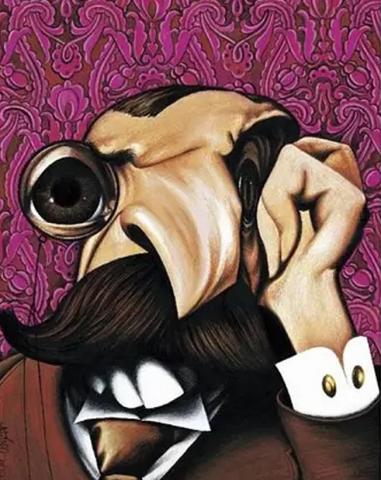
Eca de Queirós
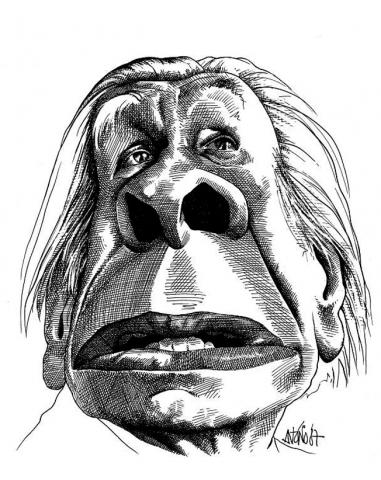
Jorge Luis Borges
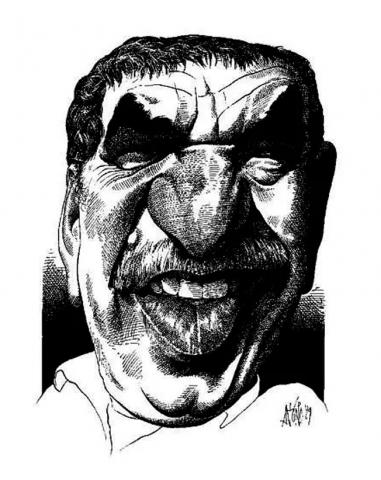
García Márquez
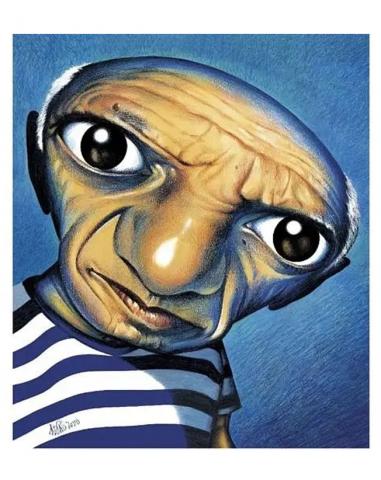
Picasso
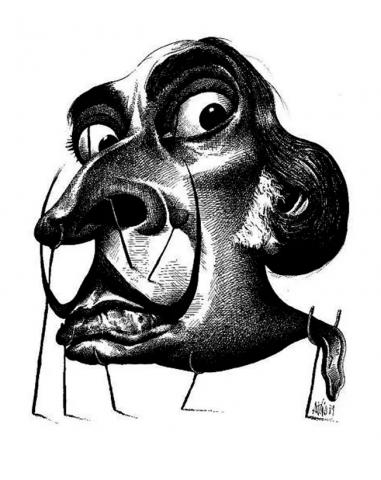
Dalí
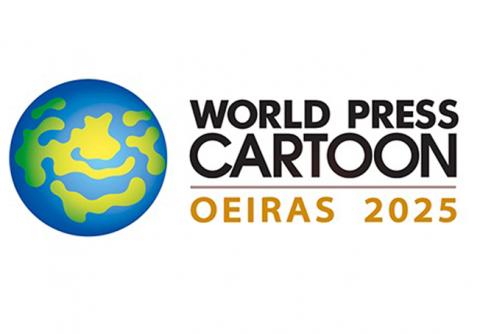
Interview with Antonio Antunes
by Pepe Pelayo
A visual artist by profession with a long career as a cartoonist, he has received numerous international awards at graphic humor festivals held in Canada, France, Italy, Sweden, and Portugal, among other countries. He has published several books, including Antonio - 20 anos de Desenhos, Desenhos satíricos, and Traços contínuos. He is also involved in sculpture and medal-making.
He has collaborated, or still collaborates, with newspapers and magazines such as Diário de Notícias, A Capital, A Vida Mundial, O Jornal, and Expresso.
It was in the November 4, 1975 edition of Expresso that a kind of comic strip titled Kafarnaum was born, which sparked great controversy. Works that would later be compiled into what became his first book.
In 1983, he published a new album, Suspendórios. That same year, he won one of the many awards that would mark his life: the Grand Prize of the 20th Montreal International Comics Festival.
In 1993, he became involved in what would be the other major controversy of his career: the Papal Condom. Also that year, Expresso celebrated its 20th anniversary by publishing his 20 best works in an anthology with a limited edition of 500 copies, numbered and signed by the artist.
On March 9, 2005, he was awarded the rank of Grand Officer of the Order of Prince Henry.
On April 11, 2023, he was awarded the rank of Commander of the Order of Liberty.
He is the director of the World Press Cartoon, the most important press cartoon exhibition.
In short, it’s a tremendous honor to have in this Vis à vis the renowned cartoonist and humor promoter, Antonio Antunes.
PP: Antonio, I’m not sure I introduced you properly with so much data. Perhaps it would be better, for Humor Sapiens followers, if you told us, at least, how would you like to be known, to be remembered?
ANTONIO: I hope to be remembered as a cartoonist and promoter of graphic humor.
PP: Just like that. Perfect. At what point did you decide to dedicate yourself to humor?
ANTONIO: On the eve of the Portuguese Revolution, many people, particularly young people, were eager to participate in this change. I found this possibility in the newspapers, and humor was the vehicle for this desire.
PP: I don’t recall anyone in this section confessing that their motivation to pursue humor was idealism. Congratulations. And did you start drawing without a style? Or if you had one, what was it? Did you have any influences from national or international cartoonists at that time?
ANTONIO: I started drawing cartoons in a very simple style, inspired by comics, but the style soon changed and my biggest influences were the Portuguese Rafael Bordalo Pinheiro and the American David Levine.
PP: You know? I’m familiar with some of Levine’s work, but I’ll tell you, I visited the Bordalo Pinheiro House Museum in Lisbon and spent a whole day enjoying his works. Unforgettable. Great influences, no doubt. So currently, what mode do you prefer: drawing humor without words or with text? Why?
ANTONIO: Initially, I used balloons with text, but as I evolved, the drawing became free from text, and the cartoon became more condensed and symbolic.
PP: I understand, but the advantage of universalizing the message is much more powerful.
ANTONIO: The challenge of communicating only through drawing is more demanding, requiring great narrative discipline.
PP: Looking at your substantial résumé, I want to ask you: which of the many awards you’ve received moved or impacted you the most?
ANTONIO: The award that moved me the most was the Grand Prix at the 20th Montreal International Exhibition, Canada - 1983 (at the time the biggest exhibition in the world, due to its importance and because it took place in the early years of my career, giving me the confidence to continue.
PP: I can imagine how thrilling it was because of the importance of the prize and because it was your first. Anyone would celebrate for a month. Now tell me, what kind of humor do you most enjoy doing? I’ll give you some options:
a – The one that simply amuses you.
b – The one that amuses you and makes you think.
c – The one that makes you think, but is only critical or satirical.
d – The burlesque, disrespectful, offensive one.
And why didn’t you choose the others? (If you left any out, of course)
ANTONIO: I prefer b) and c). The genres described in a) and d) are, in my opinion, minor genres.
PP: I’ll have to disagree with you there. For me, pure amusement is very important for the human being. I don’t consider it lesser—on the contrary. Just today I was rereading Quino’s books (not Mafalda), and that clean humor really amuses me. I do agree with you that supposedly offensive, aggressive, or humiliating humor is inferior. Well, not just inferior—it’s objectionable in my humble opinion. And this brings up the next obvious question: what are the limits of humor, if there are any?
ANTONIO: The limits of humor should be those that can be ethically defended.
PP: “They should be,” you say, but they almost never are. There are external limits imposed by authoritarian governments, the commercial interests of the media, or the “politically correct” of certain groups, etc. None of them can be ethically defended, as you say, but they’re there, unfortunately. By the way, have you ever been censored? Do you self-censor a lot, a little, or never?
ANTONIO: No, I have never been censored, but I have had some problems afterwards. I prefer to call it adequacy rather than self-censorship. Adequacy of form but not of content, to the editorial status of the publication, to the culture of the country, etc.
PP: If you qualify it that way just by form, that’s fine. How do you see the present and future of graphic humor?
ANTONIO: The present of graphic humor is experiencing a more general crisis in the written press. I want to believe that the situation will improve in the future, despite social networks and now also artificial intelligence (AI), but I have, of course, many doubts.
PP: I agree. I think we’re currently in a crisis due to the lack of space, polarization in the world, etc. But I’m optimistic about the future too. As I always say, we just need to solve the issue of copyright on the Internet and many things would be resolved. But to move away from such gloomy thoughts, could you share a funny, curious, or clever anecdote you’ve experienced in your career in humor?
ANTONIO: I took my first steps as a cartoonist by leaving a folder of drawings in the newspaper “República” and, some time later, when they wanted to publish it, they didn't know how I should sign it and my first cartoon came out without an author's name – with the usual inscription “drawing by...” and a blank space. In the second cartoon, a journalist who was from my country decided to use my first name, António, so that there would be no more blank space, and that's how it stayed.
PP: Nice anecdote—and historic too. That signature of yours, “Antonio,” has taken you far in this career, hasn’t it?
ANTONIO: I have had a career dotted with awards at major international exhibitions in Canada, France, Italy and Sweden, and with many solo exhibitions in France, the Netherlands, Macau, Brazil and Spain. I have also been a member of the jury at several exhibitions in Italy, Brazil, Serbia and Greece. I am also the director of World Press Cartoon and president of the jury.
PP: Well, you say it quickly, but we know that World Press Cartoon is the most important press cartoon competition in the world. Let me take this opportunity to congratulate you. And to finish, what would you say to me as a humorist?
ANTONIO: I would say that humor is a very serious thing.
PP: If only everyone thought that way. And lastly, Antonio, could you share a few words with the readers of Humor Sapiens?
ANTONIO: It is important that Humor Sapiens is appreciated by its readers as an open window into the world of graphic humor.
PP: Thank you very much for agreeing to this Vis à vis, for your time, and for your attention. I wish you good health and continued success! A warm embrace.
(This text has been translated into English by ChatGPT)

